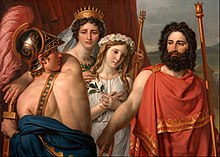
Back إيفيجينيا في أوليس Arabic Ifigenia a Àulida Catalan Ífigenie v Aulidě Czech Iphigenie in Aulis German Ιφιγένεια εν Αυλίδι Greek Ifigenia en Áulide Spanish Ifigeneia Auliissa Finnish Iphigénie à Aulis French Ifixenia en Áulide Galician איפיגניה באאוליס HE
| Iphigenia in Aulis | |
|---|---|
 | |
| Written by | Euripides |
| Chorus | Greek Women of Chalcis. |
| Characters | Agamemnon Old servant Menelaus First Messenger Clytemnestra Iphigenia Achilles Second Messenger |
| Date premiered | 405 BC |
| Place premiered | Athens |
| Original language | Ancient Greek |
| Genre | Tragedy |
| Setting | Port of Aulis |
Iphigenia in Aulis or Iphigenia at Aulis[1] (Ancient Greek: Ἰφιγένεια ἐν Αὐλίδι, romanized: Īphigéneia en Aulídi; variously translated, including the Latin Iphigenia in Aulide) is the last of the extant works by the playwright Euripides. Written between 408, after Orestes, and 406 BC, the year of Euripides' death, the play was first produced the following year[2] in a trilogy with The Bacchae and Alcmaeon in Corinth by his son or nephew, Euripides the Younger,[3] and won first place at the City Dionysia in Athens.[2]
Set prior to the commencement of the Trojan War, "Iphigenia at Aulis" revolves around the strong resistance by Clytemnestra to the decision of her husband, Agamemnon, the leader of the Greek coalition before and during the Trojan War, to ritually sacrifice and kill his daughter, Iphigenia, to appease the goddess Artemis. This would allow his troops to set sail to preserve their honour in order to battle and ultimately sack Troy, actions which would result in the killing of all of Troy's men and the enslavement of all of its women by Agamemnon and the Greek men.[4] These latter events are central to several of the Greek tragedies such as Euripides' "Hecuba" and "The Trojan Women", as well as Aeschylus' play "Agamemnon".
The conflict in "Iphigenia at Aulis" also focuses closely on Iphigenia's initial resistance to the idea of dying/being killed and her relationship with her father and, to a lesser degree, on a young Achilles, who is drawn into the situation by Agamemnon. Also known to the audience of Athenians who witnessed the play's performance would have been the fact that, as a result of Agamemnon's actions, after the war he will be killed upon his homecoming by his wife, Clytemnestra, and that she in turn will be killed by her son, Orestes, in order to avenge his father. All appear in "Iphigenia at Aulis".[4]
- ^ Coleridge, Edward P. (1891). The Plays of Euripides. Vol. 2. London: George Bell & Sons, York Street. Covent Garden. p. 389. ark:/13960/t3mw3gr3d.
- ^ a b See Hans Christian Günther, Euripides. Iphigenia Aulidensis, Leipzig, Teubner, 1988, p. 1.
- ^ See Suda, s.v. Εὐριπίδες.
- ^ a b Euripides (2000-01-01), Morwood, James (ed.), "The Bacchae", Oxford World's Classics: Euripides: Iphigenia among the Taurians; Bacchae; Iphigenia at Aulis; Rhesus, Oxford University Press, p. 44, doi:10.1093/oseo/instance.00185383, ISBN 978-0-19-954052-5, retrieved 2023-02-11